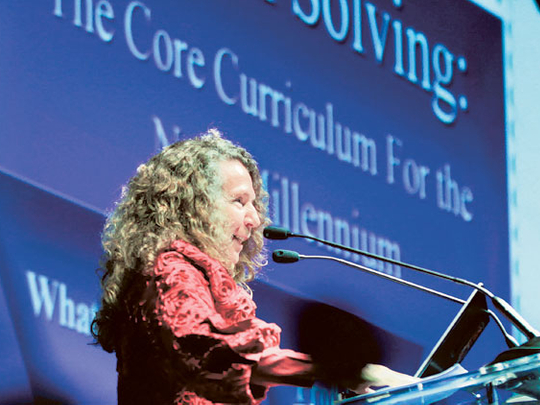
Dubai: Parents of children who are much too eager to learn and solve complex problems but show ‘odd’ behaviour in normal circumstances must take extra caution against getting a misdiagnosis of their children’s condition as this may have serious repercussions on their growth and development, experts have warned.
Proper and early detection of giftedness in children is a very important step in developing the child’s potential. Often, some gifted children may show behavioural problems during class activities because of boredom and frustration. Several studies have been conducted citing the possibilities of misdiagnosis or dual diagnosis of gifted children. They most commonly are branded as having Attention Deficit Hyperactive Disorder (ADHD) or mood disorders.
Gulf News spoke to Dr June Maker, an expert in the field of special education for gifted children at the University of Arizona, to shed light on the dangers of misunderstanding and misdiagnosing gifted children. Dr Maker was a guest speaker at the 12th Asia Pacific Conference on Giftedness, a five-day conference being held in the Gulf region for the first time. The conference aims to provide professionals with reliable methodologies and best practices to identify and nurture talented children.
“The danger is that you are focused on the disability rather than the ability. But the most important thing is to look at the positive attributes of your child, whatever they may be and to not compare one child with another in the family,” Dr Maker said.
“I truly believe that it [misdiagnosis] happens a lot more frequently than we think. So it may be 25 to 30 per cent of the time. And I found that there are two disabilities that tend to mask giftedness more than others — ADD (Attention Deficit Disorder) and Asperger’s,” she added.
The dangers of a misdiagnosis, Dr Maker said, could go as far as adults tending to control the child’s behaviour, thereby limiting his potential.
“As an effect, they wouldn’t want to go to school at all. They would give up. We’ll lose all of them, all of the contributions that these children can make. And also, they’ll lose their sense of pride, their sense of well-being, their sense of belief in themselves,” Dr Maker said.
Awareness among parents is hence key to unlocking their children’s potential. Dr Maker said that parents should watch out for the early signs of giftedness: if they can’t keep up with their child’s curiosity and energy; if the child takes things apart to try to figure them out, or draws at a fairly advanced level; or a child is more interested in the things that older children are interested in.
And to better understand the child, Dr Maker said, there is only one solution. “The advice that one gifted child gave me was: “If you want to know what will help me, just ask.” Parents ask all kinds of other people but they don’t ask the child. The child doesn’t always know, but a lot of times the child does know what will help them,” Dr Maker said.












